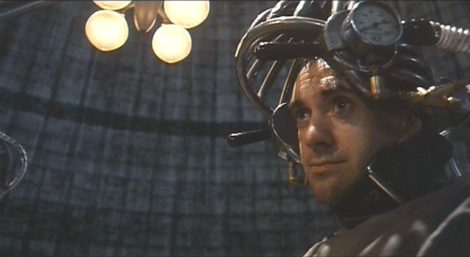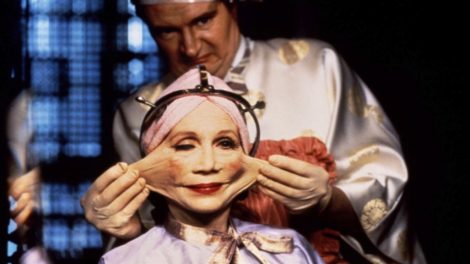Brazil
Front Row at the Movies by Shirrel Rhoades
[mr_rating_result]Ary de Resende Barroso’s samba song “Brazil” has been performed by such diverse singers as Bing Crosby, Harry Belafonte, Paul Anka, and Dione Warwick. And it has been featured in such films as Walt Disney’s “Three Caballeros,” Alfred Hitchcock’s “Notorious,” Busby Berkeley’s “The Gang’s All Here,” and “Stars Wars: The Last Jedi.”
“Brazil” was also the title (and theme song) for Terry Gilliam’s 1985 dark satire. This week that movie is getting a screening at Tropic Cinema.
Despite its title, Brazil has nothing to do with the South American country nor does it take place there. The film takes its name from the song that’s properly titled “Aquarela do Brasil” (“Watercolor of Brazil”), but known simply as “Brazil” to British audiences.
The British Film Institute picked “Brazil” as the 54th Greatest British Film of All Time.
 While director Terry Gilliam is actually an American (born in Minneapolis), he is best known as a long-time member of the Monty Python comedy troupe, that madcap British group who gave sketch comedy a surreal twist (TV’s “Monty Python’s Flying Circus,” “Monty Python and the Holy Grail”).
While director Terry Gilliam is actually an American (born in Minneapolis), he is best known as a long-time member of the Monty Python comedy troupe, that madcap British group who gave sketch comedy a surreal twist (TV’s “Monty Python’s Flying Circus,” “Monty Python and the Holy Grail”).
“Brazil” was a reaction to Gilliam’s frustration with bureaucratic society. The working title was “The Ministry,” a more-to-the-point description. Other proposed titles included “The Ministry of Torture, How I Learned to Live with the System –So Far” or “So That’s Why the Bourgeoisie Sucks.”
Gilliam wrote the script with the help of actor Charles McKeown, playwright Tom Stoppard, and (uncredited) novelist Charles Averson. The screenplay was nominated for an Academy Award.
Gilliam admits the film was based somewhat on George Orwell’s dystopian social science fiction novel, “1984.” Some critics refer to Gilliam’s film as “1984½.”
Gilliam often cites Frederico Fellini (“8½”) as one of the defining influences on his visual style.
Gilliam explains, “‘Brazil’ came specifically from the time, from the approaching of 1984. It was looming. In fact, the original title of ’Brazil’ was ‘1984 ½.’ Fellini was one of my great gods and it was 1984, so let’s put them together.”
Ironically, Gilliam admits he’s never read Orwell’s book.
The plot is absurdist, the second in his “Trilogy of Imagination” films, starting with “Time Bandits” (1981) and ending with “The Adventures of Baron Munchausen” (1988).
The mind-bending plot focuses on Sam Lowry (Jonathan Pryce), a lowly bureaucrat with “a mind-numbing job and living in a small apartment, set in a dystopian world in which there is an over-reliance on poorly maintained (and rather whimsical) machines.” Sam has disturbing dreams of himself as a winged warrior saving a damsel in distress (Kim Greist), who may or may not be an accused terrorist in real life.
Sam’s life goes awry when a fly gets stuck in his teleprinter, blurring a letter in a name. As a result, a cobbler named Archibald Buttle (Brian Miller) gets executed instead of a renegade heating engineer named Archibald “Harry” Tuttle (Robert De Niro).
The various actors appearing in this cautionary tale include Ian Holm, Katherine Helmond, Ian Richardson, Bob Hoskins, Jim Broadbent, and Gilliam’s Monty Python colleague Michael Palin. Charles McKeown and Terry Gilliam make brief walk-on appearances.
Why did Gilliam pick the song “Brazil” to be the theme of his movie?
 He says, “This place was a métallurgie city, where everything was covered by a gray metallic dust … Even the beach was completely covered by dust, it was really dusky. The sun was going down and was very beautiful. The contrast was extraordinary. I had this image of a man sitting there in this sordid beach with a portable radio, tuned in those strange escapist Latin songs like ‘Brazil.’ The music took him away somehow and made the world seem less blue to him.”
He says, “This place was a métallurgie city, where everything was covered by a gray metallic dust … Even the beach was completely covered by dust, it was really dusky. The sun was going down and was very beautiful. The contrast was extraordinary. I had this image of a man sitting there in this sordid beach with a portable radio, tuned in those strange escapist Latin songs like ‘Brazil.’ The music took him away somehow and made the world seem less blue to him.”
Or as author Salman Rushdie wrote in his lengthy review of the film (“The Location of Brazil”): “Where have we come to? What kind of place is Oz, or Wonderland? By what route, with or without a Ford Galaxy, may one arrive at Alphaville? Specifically – for the purposes of this essay – where is Brazil?”
In his exploration of the political use of the fantastic, Rushdie concluded that “Brazil” is an “anti-essentialist view” place.
In the film, Sam and Tuttle flee from the horror of Orwellian totalitarianism towards a Brazil that exists in a song, in a dream, in cinema itself, “because in the cinema the dream is the norm.”
So where is Brazil?
In the realms of imagination.
Email Shirrel: srhoades@aol.com


Ratings & Comments
[mr_rating_form]